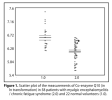Unravelling the Connection Between Energy Metabolism and Immune Senescence/Exhaustion in Patients with Myalgic Encephalomyelitis/Chronic Fatigue Syndrome
Jente Van Campenhout, Yanthe Buntinx, Huan-Yu Xiong, Arne Wyns, Andrea Polli, Jo Nijs, Joeri L. Aerts, Thessa Laeremans, Jolien Hendrix
[Line breaks added]
Abstract
Myalgic Encephalomyelitis/Chronic Fatigue Syndrome (ME/CFS) is a debilitating disease, characterized by a diverse array of symptoms including post-exertional malaise (PEM), severe fatigue, and cognitive impairments, all of which drastically diminish the patients’ quality of life. Despite its impact, no curative treatments exist, largely due to the limited understanding of the disease’s underlying pathophysiology.
Mitochondrial dysfunction, leading to impaired energy production and utilization, is believed to play a key role in the onset of fatigue and PEM, positioning it as a potential key pathophysiological mechanism underlying ME/CFS. Additionally, the disorder shows similarities to chronic viral infections, with frequent reports of immune system alterations, suggesting a critical role for immune (dys)functioning. In particular, the roles of immune senescence and immune exhaustion—two fundamental immune states—remain poorly understood in ME/CFS.
This state-of-the-art review explores how metabolic dysfunction and immune dysfunction may be interconnected in ME/CFS, proposing that energy deficits may directly impair immune function. By examining this metabolic–immune interplay, this review highlights potential pathways for developing innovative therapeutic strategies that target both energy metabolism and immune regulation, offering hope for improving patient outcomes.
Link | PDF (Biomolecules) [Open Access]
Jente Van Campenhout, Yanthe Buntinx, Huan-Yu Xiong, Arne Wyns, Andrea Polli, Jo Nijs, Joeri L. Aerts, Thessa Laeremans, Jolien Hendrix
[Line breaks added]
Abstract
Myalgic Encephalomyelitis/Chronic Fatigue Syndrome (ME/CFS) is a debilitating disease, characterized by a diverse array of symptoms including post-exertional malaise (PEM), severe fatigue, and cognitive impairments, all of which drastically diminish the patients’ quality of life. Despite its impact, no curative treatments exist, largely due to the limited understanding of the disease’s underlying pathophysiology.
Mitochondrial dysfunction, leading to impaired energy production and utilization, is believed to play a key role in the onset of fatigue and PEM, positioning it as a potential key pathophysiological mechanism underlying ME/CFS. Additionally, the disorder shows similarities to chronic viral infections, with frequent reports of immune system alterations, suggesting a critical role for immune (dys)functioning. In particular, the roles of immune senescence and immune exhaustion—two fundamental immune states—remain poorly understood in ME/CFS.
This state-of-the-art review explores how metabolic dysfunction and immune dysfunction may be interconnected in ME/CFS, proposing that energy deficits may directly impair immune function. By examining this metabolic–immune interplay, this review highlights potential pathways for developing innovative therapeutic strategies that target both energy metabolism and immune regulation, offering hope for improving patient outcomes.
Link | PDF (Biomolecules) [Open Access]

